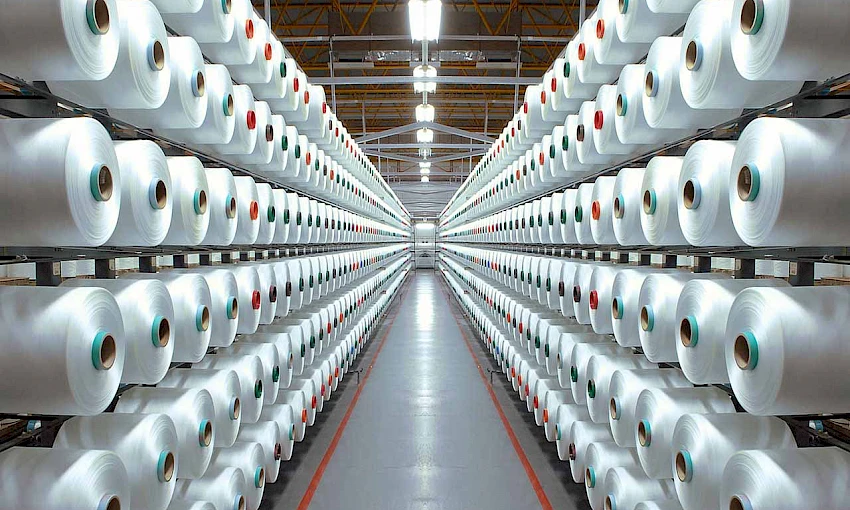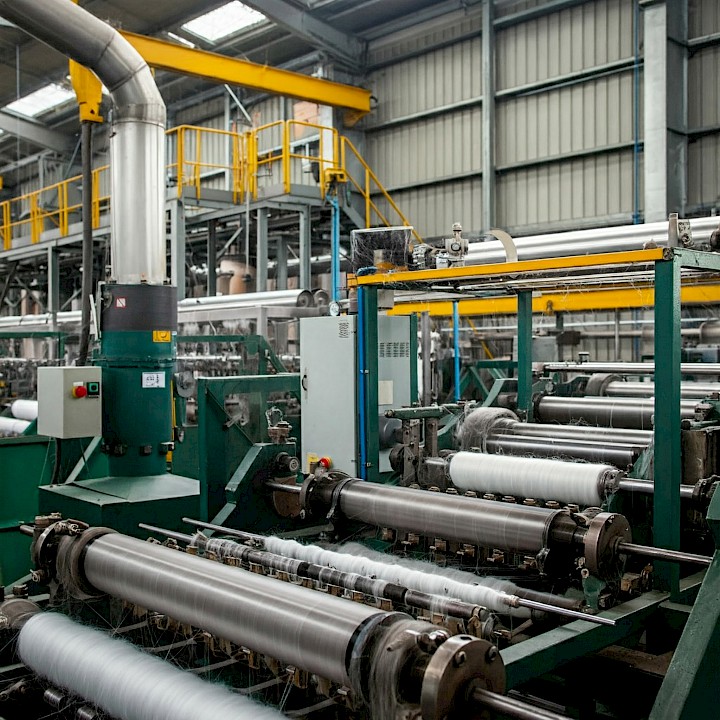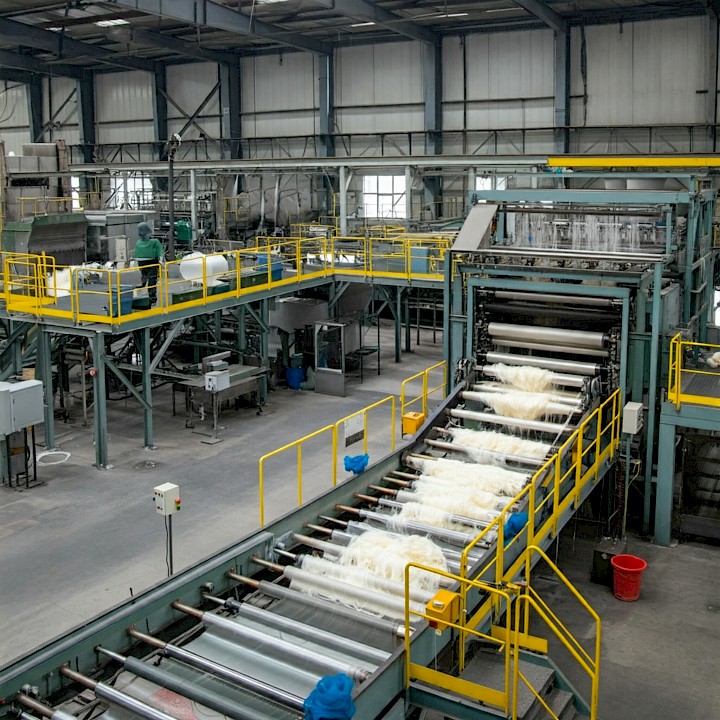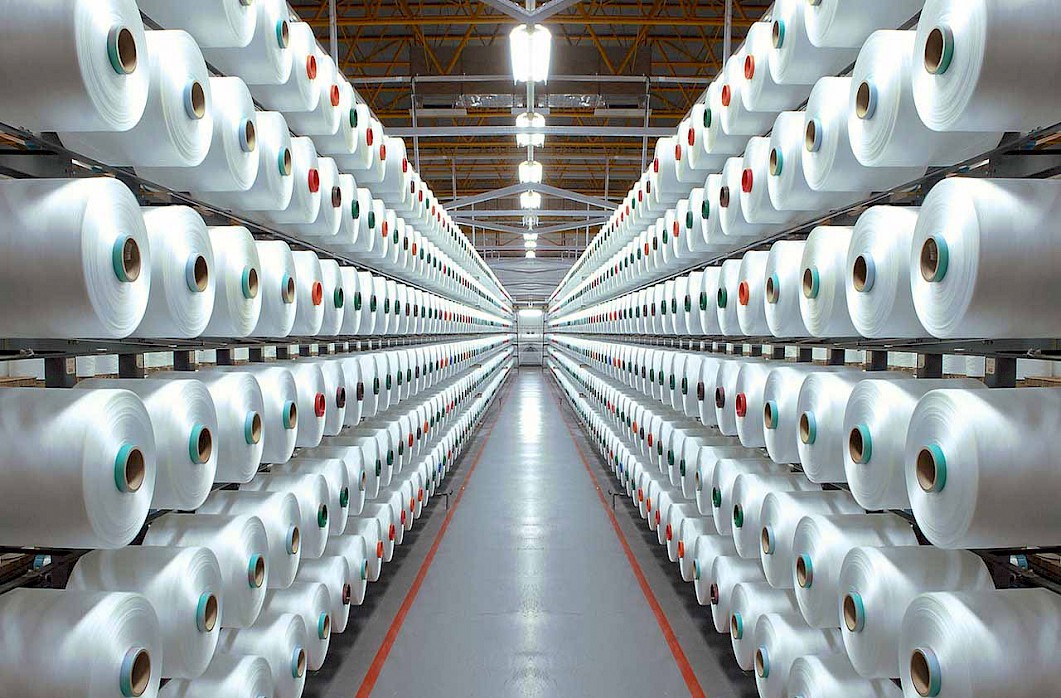
What are Polyester Production Plants?
Polyester production plants are complex industrial facilities designed to transform chemical raw materials into a variety of polyester products, including synthetic fibers, plastic sheets, granules, and more. These plants play a crucial role in manufacturing polyester products used in various industries, such as textiles, automotive, construction, packaging, and many others.

Production Process:
The production of polyester involves several key stages:
-
Raw Material Preparation: Raw materials like ethylene glycol and terephthalic acid are precisely weighed and mixed in the desired purity and ratios.
-
Polycondensation: The mixed raw materials undergo a controlled chemical reaction under high temperature and pressure, forming polyester polymer chains. This reaction takes place in specially designed reactors.
-
Melting: The resulting polyester polymer is melted into a viscous liquid. Heating and mixing systems ensure homogeneous melting and achieve the desired viscosity.
-
Shaping: The molten polyester is shaped into various forms. It can be cast into molds to create plastic sheets or granules, or it can be fed into extrusion lines to produce fibers. Molds provide precise dimensions and shapes, while extrusion lines ensure continuous and uniform production.
-
Cooling and Solidification: The shaped polyester products undergo a controlled cooling process to solidify. This step ensures the desired mechanical properties and dimensional stability of the final product.
-
Finishing: The solidified polyester products are dried, cut, and packaged. Throughout this stage, strict quality control measures are implemented to ensure product quality and compliance.
Environmental Impact:
Polyester production plants are operated with a focus on minimizing environmental impact. Various measures are taken to prevent air and water pollution, including treating waste gases and recycling production waste.
Polyester Production Plants in Turkey:
The importance of polyester production plants is increasing in Turkey with the advancements in the textile and plastics industries. Various facilities operating in the country play a significant role in the production and export of polyester products. These plants utilize the latest technologies to manufacture high-quality polyester products while operating in an environmentally responsible manner.
Applications and Uses of Polyesters:
Polyester is one of today's most widely used synthetic materials, found in a broad range of applications, from textiles and packaging to electronics and medicine. Its exceptional durability, flexibility, and versatility make it an indispensable part of the modern world.

Key Applications:
-
Clothing and Home Textiles: Polyester fibers and microfibers are widely used in garments, home textiles, and industrial fabrics. Polyester's breathability, wrinkle resistance, and colorfastness offer comfort and practicality in everyday wear and home furnishings.
-
Packaging and Bottling: Polyester is often preferred for PET bottles and films used in packaging. Its lightweight, durability, and barrier properties help keep food fresh for extended periods and reduce packaging waste.
-
Photography and Imaging: Polyester is used in photographic films, enabling high-resolution and sharp images.
-
Composite Materials: As a key component in glass-reinforced plastics (fiberglass) and other composite materials, polyester's lightweight and strength are crucial in automotive, aerospace, and construction applications.
-
Electronics and Electrical: Polyester is used in LCD screens, holograms, and filters, contributing to image clarity and color accuracy. It is also preferred in products like dielectric films for capacitors, insulation films for wires, and insulation tape.
-
Carpet Industry: Polyester fibers offer advantages such as durability, stain resistance, and fade resistance in carpets. This ensures that carpets retain their beautiful appearance for a long time and are easy to clean.
-
Medical Applications: Polyester is also preferred in medical textile products used as sutures. Its suitability for sterilization and biocompatibility make it a reliable material in medical applications.
Advantages of Polyester:
-
Durable and long-lasting
-
Flexible and moldable
-
Breathable
-
Wrinkle-resistant
-
Colorfast
-
Stain-resistant
-
Easy to clean
-
Lightweight
-
Recyclable

Writer:
Professor Doctor Mustafa Yaşar
Industrial Design Engineer





































